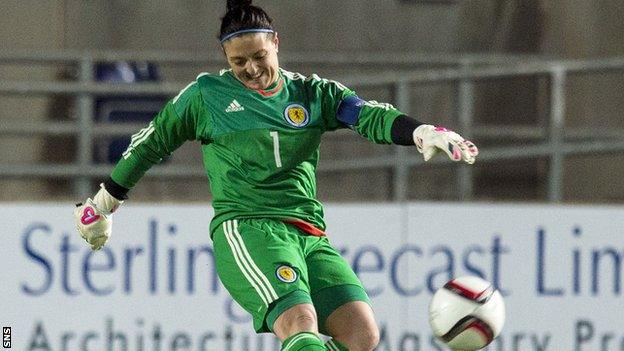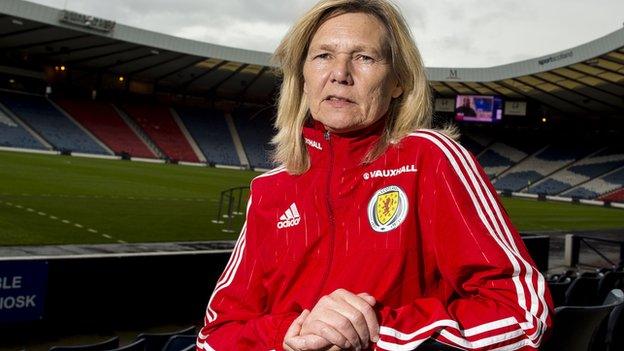Scotland: Why are the women's squad in dispute with the SFA?
- Published

Scotland goalkeeper Gemma Fay is the captain and leading figure in the women's squad
The Scotland Women's squad for the Euro 2017 finals in the Netherlands was due to be revealed on Tuesday, but the announcement has been postponed for a week.
The tournament kicks off next month, and the national team is continuing its series of warm-up matches in preparation, but the build-up has been affected by a dispute between the players and the Scottish Football Association.
The squad has refused to fulfil any media duties - including with the SFA's in-house team - or participate in any filming with the tournament's broadcast partner, Channel 4. The players have also declined to work with sponsors or participate in some mandatory Uefa media events.
The Scottish FA will meet representatives of the squad on Wednesday in an attempt to negotiate an end to their dispute.
What is at the heart of the dispute?
In short, the squad has raised complaints over financial, commercial and equality issues.
Why now?
Maximum impact, with Euro 2017 approaching, but also because qualifying for the finals of a major tournament brought the matter to a head.
Are the grievances valid?
There is no way to judge the stance of either side in the dispute, since they are making no comment, either on or off the record. The details of the grievances have not entered the public domain. "We can confirm that we are in discussions with the Scotland women's national team players regarding terms and conditions ahead of the Women's Euros in the Netherlands next month," said a spokesman for the SFA. "Recent discussions have been positive and we are hopeful that an agreement will be reached in the near future."
What are the financial rewards for Scotland qualifying for the finals?
The SFA received £265,000 for the team reaching the finals, and would bank another £175,000 should they make it as far as the quarter-finals. However, the squad has also taken part in an extensive build-up to the finals, including two friendlies against Denmark in Cyprus in January, one month before playing in the Cyprus Cup. Since finishing the qualifying campaign in September last year, Scotland have played six friendlies, as well as four Cyprus Cup matches, and have one final friendly against the Republic of Ireland to play, all of which required SFA funding.

Scotland head coach Anna Signeul has resolutely refused to be drawn into the dispute
What do the players earn while playing for Scotland?
There are no match fees - which is exactly the same situation with the men's team, who receive a bonus to be shared amongst squad members should they qualify for major finals. However, the home-based players do receive a bursary to cover loss of earnings for the build-up to a participation in the Euro 2017 finals. The players also receive daily allowances while they are with the national team.
For how long has the dispute been brewing?
It came to a head in recent weeks, with PFA Scotland engaged by the squad to negotiate with the SFA on their behalf, but discussions began late last year to try to reach a resolution.
What is Anna Signeul's stance?
The head coach has insisted on being an independent figure, without supporting either side. Signeul points out that the men's national team head coach, Gordon Strachan, does not get involved in the negotiation of terms and conditions, with a player being appointed by the squad to represent them. "It is between the SFA and the players and I don't think Gordon has anything to do with this either, it's nothing to do with us coaches," Signeul said.
Has anything like this happened before?
The Republic of Ireland's women's team threatened to not attend a Football Association of Ireland training camp in April in a dispute over a number of issues, including financial terms, gym and training gear provision. One difference was that a group of the Irish players spoke to the media on behalf of the squad to outline their concern about having to take unpaid leave to attend the training camp. The Professional Footballers' Association of Ireland became involved and the dispute was resolved.